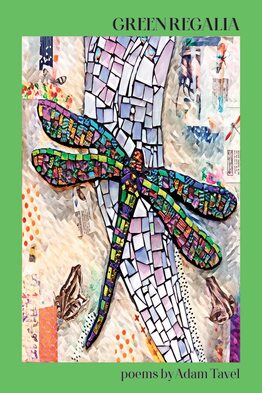Nature is boundless: it covers just about everything we know. And yet, as modern technology progresses, nature has somewhat morphed into a monstrosity in our everyday lives. Many people today fear the unknown depths of the natural world and shy away from exploring it too closely. What might we be missing out on by avoiding nature in all of its pure and chaotic glory? Adam Tavel’s Green Regalia answers this question, among others. Tavel explores the more comforting aspects of nature through fresh metaphors and experimental phrasing. In all of nature’s chaos and climates, there exists an atmosphere of comfort that Tavel draws attention to. Tavel’s environmentally-themed collection begins with a poem titled “How to Write a Nature Poem.” This poem serves almost as an epigraph, foreshadowing the rest of the collection, which artfully guides the reader through understanding the environment’s present and prevalent hold on our lives. Through use of nature images, Tavel creates deeper themes surrounding family, identity and finding solace in uncontrollable external factors. Tavel’s poetry contains a carefully crafted dichotomy between nature and family- more specifically the relationship between the speaker and the father. Through each narrated experience, nature serves as the overarching sense of comfort for the speaker. In “Vigil,” the speaker details an experience the summer their father left, claiming, “I drowned / my snuggle lamb inside our kiddie pool” (line 1-2). Through this act, we observe grief in the form of rebelling against a physical, unnatural object meant to represent something natural. Both the kiddie pool and the snuggle lamb are both fabrications of real living beings (lambs and deep lakes, rivers, oceans). During this spectacle, the “audience of bees” are buzzing nearby, later almost saying “you’re getting close” as the snuggle lamb nears total destruction. These bees exist in the absence of the speaker’s father and family, supplementing the companionship a family would provide in this circumstance. In this sense, nature is there for the speaker throughout the hardships that come with an absent father.
Tavel ties nature as comfort into many other family scenarios throughout the collection. In “Motel Light,” Tavel writes about refilling an ice bucket (full of moonlight) each time an unnamed family member’s “gin ran low” (line 7). The speaker refills the glass with “moonlight” because they have already established nature as a form of relief. So, as the gin provides the family member some sort of solace, the speaker views it as something natural, as light shining down from the moon. Alcoholism returns throughout the collection as something the “adults” experience, as well as the speaker at an older age. We see a shift in time in “Painting Toes,” where the speaker claims, “Most nights I drank the moon away” (lines 14-17). Alcoholism, infused with the moon, appears to represent a way of coping, as well as nature. As the speaker grows older, they continue to entwine nature with their evolving coping mechanisms. Since nature is such a familiar method for solace and comfort, the speaker incorporates natural symbols into their drinking habits (the moon especially). The speaker continues to draw connections between himself and his father, while using nature as a way to safely cushion the two. In “Patter,” the speaker writes, “The only sound my father loved was rain / at night” (lines 1-2). The poet then draws a connection as well: “A boy, I drowned inside it too” (lines 3-4). The boy then sneaks outside and engulfs himself in the outer conditions, only to return to his bed later to sleep. Coming to terms with the unsteady relationship with his father, the boy uses nature as a mediator, as a sense of understanding between the two. He goes outside as his dad would to better understand his dad, to bridge the distance between them both physically and emotionally. In this sense, nature continues to comfort and support the speaker. Tavel successfully relays the individual impact nature can have on those who dare to explore further than what meets the eye. Throughout the collection, nature is both powerful, forceful, and soothing. Comfort exists in the external chaos. And Tavel skillfully portrays this distinction. Green Regalia was a pleasant read. There were some dated references throughout: Abe Lincoln, Caesar, Oedipus, and Napoleon, among other historical and biblical figures. These poems all fit with the theme of nature, but might be a bit inaccessible to every reader. There are many other interesting themes throughout, though. Most prevalent are the poems about family, identity, and the space we encounter in each corner of the outside world. Tavel’s poetry shows us that there is something enchanting and meaningful just outside the window. Using expressive language to describe what some might find ordinary, Tavel emphasizes the significance of absorbing all nature has to offer. Most importantly, when it feels like humans and modern technology have abandoned us, there are the bees, the moon, and the rain to comfort us.
0 Comments
Leave a Reply. |
Archives
July 2024
Categories
All
|
|
Glassworks is a publication of Rowan University's Master of Arts in Writing 260 Victoria Street • Glassboro, New Jersey 08028 [email protected] |
All Content on this Site (c) 2024 Glassworks
|


 RSS Feed
RSS Feed
